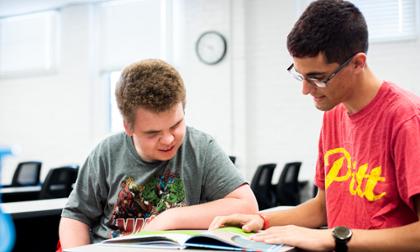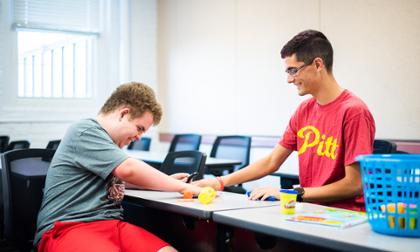First you must connect letters in these sentences to sounds, then put those sounds in the right order. Many of us skim along sentences like this one and read it just fine — we almost don’t even think about it.
But in each group of five people you know, chances are one of them has dyslexia, national statistics show.
October is Dyslexia Awareness Month, and the Pittsburg State University Center for READing is working to generate awareness for a learning disability that makes it difficult to read, write, and spell in spite of normal intelligence and adequate instruction.
In the U.S., about one third of students can’t read on grade level. In Kansas, only 34 percent of fourth graders are reading at or above a proficient level.

What causes it?
A brain’s inability to match the letters seen on a page with the sounds that those letters and combinations of those letters make.
When that step is difficult, it makes all the steps that follow — like pulling words together into sentences, and then into paragraphs — harder.
“It doesn’t mean that students aren't trying or aren't intelligent,” said Alex Fender, director of operations for the center. “It just means they need to be taught in a different way.”
The Center for READing (Research, Evaluation and Awareness of Dyslexia) has earned statewide and national attention in recent years, but here at Pittsburg State, it flies under the radar.
Located on the second floor of Whitesitt Hall, it’s part of the Department of Psychology & Counseling. It is the brainchild of University Professor David Hurford, who also chairs the department and has become known as an expert with regard to reading disorders.
Goals
Fender, the director of operations, got her start in the center as a graduate student.
Her goals are many, but all lead to the same outcome: improving the reading ability of school-age children. Reading failure can lead to a host of other problems, Fender noted — including a higher likelihood of dropping out and struggling with mental health.
A staggering 30 percent of students with dyslexia also have ADHD. Having both is what leads to increased academic difficulties, higher rates of unemployment, and incarceration.
“Ultimately our goal is to eliminate reading failure,” she said. “It’s a problem in our state and in our nation. The science is there. We can and should be doing better.”

Approaches
Services are available at the center on a continual basis.
“We provide evidence-based evaluations, interventions, and help with other reading disabilities and attention disorders like ADHD,” Fender said.
Grants, funding from the university, and sliding scale fees based on a family’s income and ability to pay eliminate barriers to service.
And once a child is being served by the center, Fender connects the child, family, and teachers with resources and research.
“We work with classroom teachers as much as we can,” she said. “During the evaluation process, we reach out to the classroom teacher to check how the child is doing emotionally and behaviorally. We maintain that connection.”
Hurford, meanwhile, is part of a statewide task force aimed at remedying the “research to practice gap.”
“We're getting better about screening and intervention, and historically we’ve known how to teach kids how to read, but we weren’t always providing that information to teachers or pre-service teachers,” Fender said. “Teachers have used variety of ways, and some worked, some didn’t.”
It’s worth noting that many of the center’s interventions will benefit typical developing readers as well as those who struggle — meaning there is no downside, Fender said, to ensuring teachers and pre-service teachers know the strategies and have support in implementing them.
One of her personal goals is to increase collaboration with Pittsburg State’s College of Education.
“Starting with the introductory class for pre-service teachers called Explorations of Education, we want to tell them about our center and what is available to them: opportunities for volunteering, employment — they don't need experience, we’ll train them, and they will gain experience working directly with kids,” she said.
Giveaways
Throughout October, the center has plans for giveaways, as well as a fundraising and awareness drive, primarily taking place through social media. The center can be found on Facebook.
The center will give away books and a full evaluation — including a hearing screening, an evaluation of reading skills, a writing assessment, a social/emotional assessment, a review of non-verbal intelligence, and a measurement of attention span.
To support the program financially, visit the Give To site and make a gift in any amount.
To inquire about services, contact the center at 620-235-4593, at READING@pittstate.edu, or stop by 209 Whitesitt Hall between 8 a.m. and 4:30 p.m. weekdays.
Learn more: